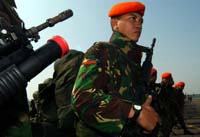Troops in Indonesia round up suspects
Troops patrolling the tense Indonesian city of Jayapura rounded up suspects Friday after a frenzied mob bludgeoned to death four security officers during a protest over the world's largest gold and copper mine. National police spokesman Brig. Gen. Anton Bachrul Alam told reporters 57 people had been arrested, though only five were named suspects, including one of the alleged protest organizers. They could face charges of assault, murder or destroying public property, he said.

Thursday's demonstration in Jayapura, Papua's provincial capital, was the most violent in a series targeting the U.S.-owned Freeport-McMoRan Copper & Gold Inc. in recent weeks and the killings of three policemen and one air force officer underscored the deep hatred many Papuans feel toward Indonesian security forces. A decades-long separatist rebellion in the remote province has left more than 100,000 dead, many of them civilians who suffered from mistreatment, starvation and other consequences of the war.
Protesters demanded that Freeport 's massive gold mine be shut, saying that while it has earned the New Orleans-based company billions of dollars, the local community has received little or no benefit. They went on a rampage after gun-toting security forces fired tear gas in an effort to break up the rally, charging demonstrators with their batons. Hundreds of shots were fired, though police insisted they did not use live ammunition.
" Indonesia should respect the Papuans," resident Robi Kubi said Friday, as a tense calm returned to the provincial capital. "We have huge natural resources, but why are they extracted by foreigners while the Papuans are still poor?"
President Susilo Bambang Yudhoyono sent top security chiefs to the region to probe the unrest, and warned that some people were trying to manipulate anger over Freeport into a push for independence. They would not succeed, he said. Hundreds of paramilitary police stood guard near the state-run university, the site of Thursday's demonstration. The campus was largely deserted on Friday.
London-based Human Rights Watch called on authorities to determine why the rally spiraled out of control. The group's Asia director, Brad Adams, said it appeared that police may have opened fire first on the demonstrators, wounding several of them, who then responded by attacking the officers with rocks and knives.
One resident, Marcus, said he was walking by the university when he heard gun shots. "I was chased by plainclothes police and then beaten up," the 31-year-old man said from Jayapura Public Hospital , his face badly bruised. "I didn't know anything about the protest, but I was a victim. My face hurts. I lost my money. And my family does not know where I am."
Freeport defends its operations in Papua, saying it pays millions of dollars in taxes each year and funds scores of local projects close to the massive mine. But the Indonesian government said Friday the company could do more.
Foreign Minister Hassan Wirajuda told visiting U.S. Secretary of State Condoleezza Rice this week that American companies operating in the sprawling archipelago should be asked to focus more on "community building," ministry spokesman Desra Percaya said.
"More could be done in the area of corporate social responsibility," Wirajuda was quoted as telling Rice, pointing to Freeport and Texas-based oil giant Exxon Mobil Corp. Papua, on the western half of New Guinea island, is Indonesia 's most remote province, politically and geographically. It has a population of around 800,000 and is off limits to foreign journalists and diplomats.
Since 2005, there has been a visible buildup of troops in the province, with reports of widespread human rights abuses, including arson, and arbitrary detention. Critics accuse the company of working closely with Indonesia 's armed forces since dictator Suharto incorporated the former Dutch colony into Indonesia in 1969 after a vote that is now widely seen as a sham, reports the AP.
N.U.
Subscribe to Pravda.Ru Telegram channel, Facebook, RSS!


